- Home
- Stephen R. Donaldson
The Power That Preserves
The Power That Preserves Read online
THE POWER THAT PRESERVES
By: Stephen R. Donaldson
The Chronicles of Thomas Covenant and Unbeliever BOOK THREE
C 1977
V 1.0
**SCANNED BY KEG APR2001**
[ONE] The Danger in Dreams
Thomas Covenant was talking in his sleep. At times he knew what he was doing; the broken pieces of his voice penetrated his stupor dimly, like flickers of innocence. But he could not rouse himself-the weight of his exhaustion was too great. He babbled like millions of people before him, whole or ill, true or false. But in his case there was no one to hear. He would not have been more alone if he had been the last dreamer left alive.
When the shrill demand of the phone cut through him, he woke up wailing.
For a moment after he threw himself upright in bed, he could not distinguish between the phone and his own flat terror; both echoed like torment through the fog in his head. Then the phone rang again. It pulled him sweating out of bed, compelled him to shamble like a derelict into the living room, forced him to pick up the receiver. His numb, disease-cold fingers fumbled over the black plastic, and when he finally gained a grip on it, he held it to the side of his head like a pistol.
He had nothing to say to it, so he waited in blankness for the person at the other end of the line to speak.
A woman's voice asked uncertainly, "Mr. Covenant? Thomas Covenant?"
"Yes," he murmured, then stopped, vaguely surprised by all the things he had with that one word admitted to be true.
"Ah, Mr. Covenant," the voice said. "Megan Roman calling." When he said nothing, she added with a touch of acerbity, "Your lawyer. Remember?"
But he did not remember; he knew nothing about lawyers. Numb mist confused all the links of his memory. Despite the metallic distortion of the connection, her voice sounded distantly familiar; but he could not identify it.
She went on, "Mr. Covenant, I've been your lawyer for two years now. What's the matter with you? Are you all right?"
The familiarity of her voice disturbed him. He did not want to remember who she was. Dully, he murmured, "It doesn't have anything to do with me."
"Are you kidding? I wouldn't have called if it didn't have to do with you. I wouldn't have anything to do with it if it weren't your business." Irritation and discomfort scraped together in her tone.
"No.'' He did not want to remember. For his own benefit, he strained to articulate, "The Law doesn't have anything to do with me. She broke it. Anyway, I- It can't touch me."
"You better believe it can touch you. And you better listen to me. I don't know what's wrong with you, but-"
He interrupted her. He was too close to remembering her voice. "No," he said again. "It doesn't bind me. I'm-outside. Separate. It can't touch me. Law is"-he paused for a moment, groped through the fog for what he wanted to say-"not the opposite of Despite."
Then in spite of himself he recognized her voice. Through the disembodied inaccuracy of the phone line, he identified her.
Elena.
A sickness of defeat took the resistance out of him.
She was saying, "-what you're talking about. I'm your lawyer, Megan Roman. And if you think the law can't touch you, you'd better listen to me. That's what I'm calling about."
"Yes," he said hopelessly.
"Listen, Mr. Covenant." She gave her irritation a free hand. "I don't exactly like being your lawyer. Just thinking about you makes me squirm. But I've never backed down on a client before, and I don't mean to start with you. Now pull yourself together and listen to me."
"Yes.'' Elena? he moaned dumbly. Elena? What have I done to you?
"All right. Here's the situation. That-unfortunate escapade of yours-Saturday night-has brought matters to a head. It- Did you have to go to a nightclub, Mr. Covenant? A nightclub, of all places?"
"I didn't mean it." He could think of no other words for his contrition.
"Well, it's done now. Sheriff Lytton is up in arms. You've given him something he can use against you. He spent Sunday evening and this morning talking to a lot of people around here. And the people he talked to talked to other people. The township council met at noon.
"Mr. Covenant, this probably wouldn't have happened if everyone didn't remember the last time you came to town. There was a lot of talk then, but it'd calmed down for the most part. Now it's stirred up again. People want action.
"The council intends to give them action. Our scrupulous local government is going to have your property rezoned. Haven Farm will probably be zoned industrial. Residential use will be prohibited. Once that's done, you can be forced to move. You'll probably get a fair price for the Farm-but you won't find any other place to live in this county."
"It's my fault," he said. "I had the power, and I didn't know how to use it." His bones were full to the marrow with old hate and death.
"What? Are you listening to me? Mr. Covenant, you're my client- for whatever that's worth. I don't intend to stand by and let this happen to you. Sick or not, you've got the same civil rights as anyone else. And there are laws to protect private citizens from-persecution. We can fight. Now I want''-against the metallic background noise of the phone, he could hear her gathering her courage-"I want you to come to my office. Today. We'll dig into the situation-arrange to appeal the decision, or file suit against it-something. We'll discuss all the ramifications, and plan a strategy. All right?"
The sense of deliberate risk in her tone penetrated him for a moment. He said, "I'm a leper. They can't touch me."
"They'll throw you out on your ear! Damn it, Covenant-you don't seem to understand what's going on here. You are going to lose your home. It can be fought-but you're the client, and I can't fight it without you."
But her vehemence made his attention retreat. Vague recollections of Elena swirled in him as he said, "That's not a good answer." Absently, he removed the receiver from his ear and returned it to its cradle.
For a long time, he stood gazing at the black instrument. Something in its irremediable pitch and shape reminded him that his head hurt.
Something important had happened to him.
As if for the first time, he heard the lawyer saying, Sunday evening and this morning. He turned woodenly and looked at the wall clock. At first he could not bring his eyes into focus on it; it stared back at him as if it were going blind. But at last he made out the time. The afternoon sun outside his windows confirmed it.
He had slept for more than thirty hours.
Elena? he thought. That could not have been Elena on the phone. Elena was dead. His daughter was dead. It was his fault.
His forehead began to throb. The pain rasped his mind like a bright, brutal light. He ducked his head to try to evade it.
Elena had not even existed. She had never existed. He had dreamed the whole thing.
Elena! he moaned. Turning, he wandered weakly back toward his bed.
As he moved, the fog turned crimson in his brain.
When he entered the bedroom, his eyes widened at the sight of his pillow; and he stopped. The pillowcase was stained with black splotches. They looked like rot, some species of fungus gnawing away at the white cleanliness of the linen.
Instinctively, he raised a hand to his forehead. But his numb fingers could tell him nothing. The illness that seemed to fill the whole inside of his skull began laughing. His empty guts squirmed with nausea. Holding his forehead in both hands, he lurched into the bathroom.
In the mirror over the sink, he saw the wound on his forehead.
For an instant, he saw nothing of himself but the wound. It looked like leprosy, like an invisible hand of leprosy clenching the skin of his forehead. Black crusted blood clung to the ragged edges of the cut,
mottling his pale flesh like deep gangrene; and blood and fluid seeped through cracks in the heavy scabs. He seemed to feel the infection festering its way straight through his skull into his brain. It hurt his gaze as if it already reeked of disease and ugly death.
Trembling fiercely, he spun the faucets to fill the sink. While water frothed into the basin, he hurried to lather his hands.
But when he noticed his white gold ring hanging loosely on his wedding finger, he stopped. He remembered the hot power which had pulsed through that metal in his dream. He could hear Bannor, the Blood-guard who had kept him alive, saying, Save her! You must!-hear himself reply, I cannot! He could hear Hile Troy's shout, Leper! You're too selfish to love anyone but yourself. He winced as he remembered the blow which had laid open his forehead.
Elena had died because of him.
She had never existed.
She had fallen into that crevice, fighting desperately against the specter of mad Kevin Landwaster, whom she had Commanded from his grave. She had fallen and died. The Staff of Law had been lost. He had not so much as lifted his hand to save her.
She had never even existed. He had dreamed her while he lay unconscious after having hit his head on the edge of the coffee table.
Torn between conflicting horrors, he stared at his wound as if it were an outcry against him, a two-edged denunciation. From the mirror it shouted to him that the prophecy of his illness had come to pass.
Moaning, he pushed away, and rushed back toward the phone. With soapy, dripping hands, he fumbled at it, struggled to dial the number of Joan's parents. She might be staying with them. She had been his wife; he needed to talk to her.
But halfway through the number, he threw down the receiver. In his memory, he could see her standing chaste and therefore merciless before him. She still believed that he had refused to talk to her when she had called him Saturday night. She would not forgive him for the rebuff he had helplessly dealt her.
How could he tell her that he needed to be forgiven for allowing another woman to die in his dreams?
Yet he needed someone-needed someone to whom he could cry out, Help me!
He had gone so far down the road to a leper's end that he could not pull himself back alone.
But he could not call the doctors at the leprosarium. They would return him to Louisiana. They would treat him and train him and counsel him. They would put him back into life as if his illness were all that mattered, as if wisdom were only skin-deep-as if grief and remorse and horror were nothing but illusions, tricks done with mirrors, irrelevant to chrome and porcelain and clean, white, stiff hospital sheets and fluorescent lights.
They would abandon him to the unreality of his passion.
He found that he was gasping hoarsely, panting as if the air in the room were too rancid for his lungs.
He needed-needed.
Dialing convulsively, he called Information and got the number of the nightclub where he had gone drinking Saturday night.
When he reached that number, the woman who answered the phone told him in a bored voice that Susie Thurston had left the nightclub. Before he could think to ask, the woman told him where the singer's next engagement was.
He called Information again, then put a long-distance call through to the place where Susie Thurston was now scheduled to perform. The switchboard of this club connected him without question to her dressing room.
As soon as he heard her low, waifish voice, he panted thickly, "Why did you do it? Did he put you up to it? How did he do it? I want to know-''
She interrupted him roughly. "Who are you? I don't know what the hell you're talking about. Who do you think you are? I didn't do nothing to you."
"Saturday night. You did it to me Saturday night."
"Buster, I don't know you from Adam. I didn't do nothing to you. Just drop dead, will you? Get off my phone."
"You did it Saturday night. He put you up to it. You called me 'Berek.' '' Berek Halfhand-the long-dead hero in his dream. The people in his dream, the people of the Land, had believed him to be Berek Halfhand reborn-believed that because leprosy had claimed the last two fingers of his right hand. "That crazy old beggar told you to call me Berek, and you did it."
She was silent for a long moment before she said, "Oh, it's you. You're that guy-the people at the club said you were a leper."
"You called me Berek," Covenant croaked as if he were strangling on the sepulchral air of the house.
"A leper," she breathed. "Oh, hell! I might've kissed you. Buster, you sure had me fooled. You look a hell of a lot like a friend of mine."
"Berek," Covenant groaned.
"What-'Berek'? You heard me wrong. I said, 'Berrett.' Berrett Williams is a friend of mine. He and I go 'way back. I learned a lot from him. But he was three-quarters crocked all the time. Anyway, he was sort of a clown. Coming to hear me without saying a thing about it is the sort of thing he'd do. And you looked-"
"He put you up to it. That old beggar made you do it. He's trying to do something to me."
"Buster, you got leprosy of the brain. I don't know no beggars. I got enough useless old men of my own. Say, maybe you are Berrett Williams. This sounds like one of his jokes. Berrett, damn you, if you're setting me up for something-"
Nausea clenched in Covenant again. He hung up the phone and hunched over his stomach. But he was too empty to vomit; he had not eaten for forty-eight hours. He gouged the sweat out of his eyes with his numb fingertips, and dialed Information again.
The half-dried soap on his fingers made his eyes sting and blur as he got the number he wanted and put through another long-distance call.
When the crisp military voice said, "Department of Defense," he blinked at the moisture which filled his eyes like shame, and responded, "Let me talk to Hile Troy." Troy had been in his dream, too. But the man had insisted that he was real, an inhabitant of the real world, not a figment of Covenant's nightmare.
"Hile Troy? One moment, sir." Covenant heard the riffling of pages briefly. Then the voice said, "Sir, I have no listing for anyone by that name."
"Hile Troy," Covenant repeated. "He works in one of your-in one of your think tanks. He had an accident. If he isn't dead, he should be back to work by now."
The military voice lost some of its crispness. "Sir, if he's employed here as you say-then he's security personnel. I couldn't contact him for you, even if he were listed here."
"Just get him to the phone," Covenant moaned. "He'll talk to me."
"What is your name, sir?"
"He'll talk to me."
"Perhaps he will. I still need to know your name."
"Oh, hell!" Covenant wiped his eyes on the back of his hand, then said abjectly, "I'm Thomas Covenant."
"Yes, sir. I'll connect you to Major Rolle. He may be able to help you."
The line clicked into silence. In the background, Covenant could hear a running series of metallic snicks like the ticking of a deathwatch. Pressure mounted in him. The wound on his forehead throbbed like a scream. He clasped the receiver to his head, and hugged himself with his free arm, straining for self-control. When the line came to life again, he could hardly keep from howling at it.
"Mr. Covenant?" a bland, insinuating voice said. "I'm Major Rolle. We're having trouble locating the person you wish to speak to. This is a large department--you understand. Could you tell me more about him?"
"His name is Hile Troy. He works in one of your think tanks. He's blind." The words trembled between Covenant's lips as if he were freezing.
"Blind, you say? Mr. Covenant, you mentioned an accident. Can you tell me what happened to this Hile Troy?"
"Just let me talk to him. Is he there or not?"
The major hesitated, then said, "Mr. Covenant, we have no blind men in this department. Could you give me the source of your information? I'm afraid you're the victim of-"
Abruptly, Covenant was shouting, raging. "He fell out of a window when his apartment caught fire, and he was killed! He never even existed!'
'
With a savage heave, he tore the phone cord from its socket, then turned and hurled it at the clock on the living-room wall. The phone struck the clock and bounced to the floor as if it were impervious to injury, but the clock shattered and fell in pieces.
"He's been dead for days! He never existed!"
In a paroxysm of fury, he lashed out and kicked the coffee table with one numb booted foot. The table flipped over, broke the frame of Joan's picture as it jolted across the rug. He kicked it again, breaking one of its legs. Then he knocked over the sofa, and leaped past it to the bookcases. One after another, he heaved them to the floor.
In moments, the neat leper's order of the room had degenerated into dangerous chaos. At once, he rushed back to the bedroom. With stumbling fingers, he tore the penknife out of his pocket, opened it, and used it to shred the bloodstained pillow. Then, while the feathers settled like guilty snow over the bed and bureaus, he thrust the knife back into his pocket and slammed out of the house.
He went down into the woods behind Haven Farm at a run, hurrying toward the secluded hut which held his office. If he could not speak of his distress, perhaps he could write it down. As he flashed along the path, his fingers were already twitching to type out: Help me help help help! But when he reached the hut, he found that it looked as if he had already been there. Its door had been torn from its hinges, and inside the hulks of his typewriters lay battered amid the litter of his files and papers. The ruin was smeared with excrement, and the small rooms stank of urine.
At first, he stared at the wreckage as if he had caught himself in an act of amnesia. He could not remember having done this. But he knew he had not done it; it was vandalism, an attack on him like the burning of his stables days or weeks ago. The unexpected damage stunned him. For an odd instant, he forgot what he had just done to his house. I am not a violent man, he thought dumbly. I'm not.
Then the constricted space of the hut seemed to spring at him from all the walls. A suffocating sensation clamped his chest. For the third time, he ached to vomit, and could not.
Gasping between clenched teeth, he fled into the woods.

 The Illearth War
The Illearth War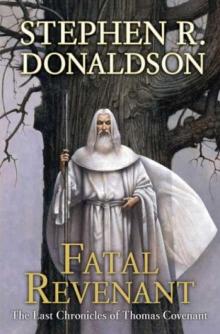 Last Chronicles of Thomas Covenant 02 - Fatal Revenant
Last Chronicles of Thomas Covenant 02 - Fatal Revenant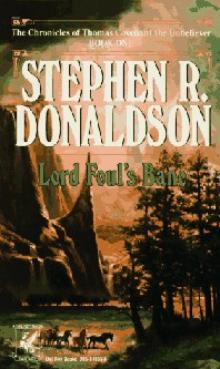 Lord Foul's Bane
Lord Foul's Bane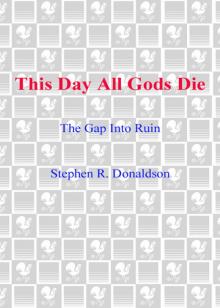 The Gap Into Ruin: This Day All Gods Die
The Gap Into Ruin: This Day All Gods Die White Gold Wielder
White Gold Wielder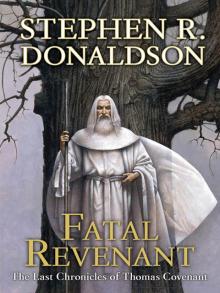 Fatal Revenant
Fatal Revenant The Mirror of Her Dreams
The Mirror of Her Dreams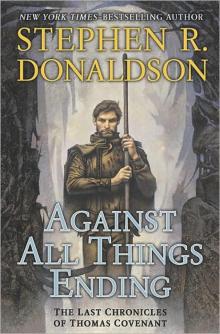 Against All Things Ending
Against All Things Ending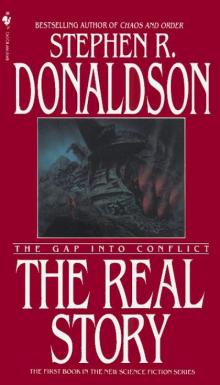 The Real Story: The Gap Into Conflict
The Real Story: The Gap Into Conflict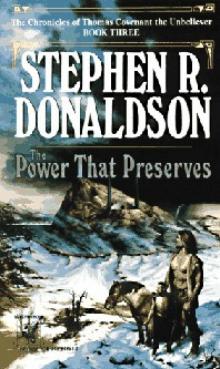 The Power That Preserves
The Power That Preserves Seventh Decimate
Seventh Decimate The Gap Into Power: A Dark and Hungry God Arises
The Gap Into Power: A Dark and Hungry God Arises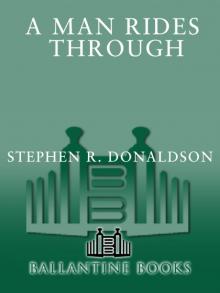 A Man Rides Through
A Man Rides Through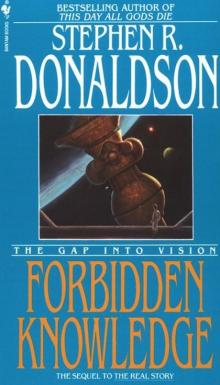 The Gap Into Vision: Forbidden Knowledge
The Gap Into Vision: Forbidden Knowledge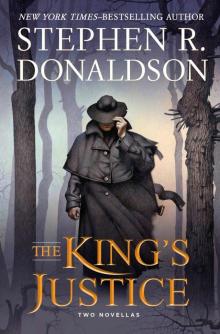 The King's Justice: Two Novellas
The King's Justice: Two Novellas The Wounded Land
The Wounded Land The Runes of the Earth
The Runes of the Earth Mordant's Need
Mordant's Need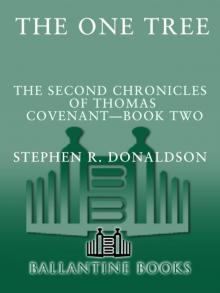 The One Tree
The One Tree Gilden-Fire
Gilden-Fire Reave the Just and Other Tales
Reave the Just and Other Tales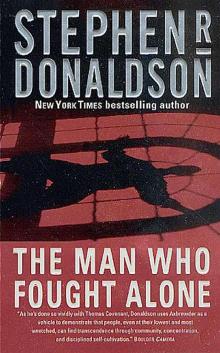 The Man Who Fought Alone
The Man Who Fought Alone The Last Dark
The Last Dark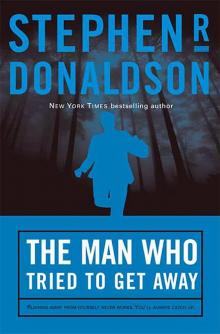 The Man Who Tried to Get Away
The Man Who Tried to Get Away Thomas Covenant 02: The Illearth War
Thomas Covenant 02: The Illearth War A Dark and Hungry God Arises
A Dark and Hungry God Arises The One Tree t2cotc-2
The One Tree t2cotc-2 Lord Foul's Bane cotc-1
Lord Foul's Bane cotc-1 The Illearth War t1cotc-2
The Illearth War t1cotc-2 The Runes of the Earth: The Last Chronicles of Thomas Covenant - Book One
The Runes of the Earth: The Last Chronicles of Thomas Covenant - Book One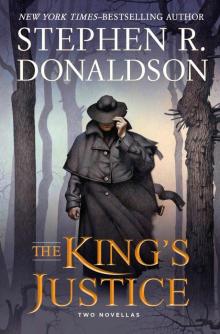 The King's Justice
The King's Justice White Gold Wielder t2cotc-3
White Gold Wielder t2cotc-3 The Power That Preserves t1cotc-3
The Power That Preserves t1cotc-3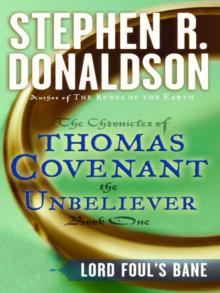 Thomas Covenant 01: Lord Foul's Bane
Thomas Covenant 01: Lord Foul's Bane Chaos and Order: The Gap Into Madness
Chaos and Order: The Gap Into Madness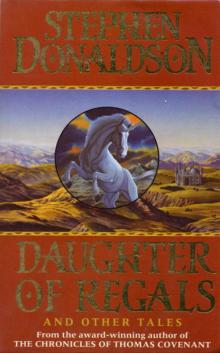 Daughter of Regals
Daughter of Regals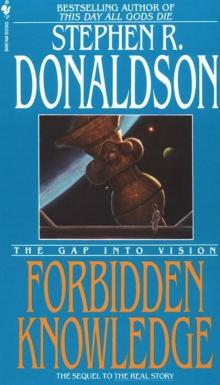 Forbidden Knowledge: The Gap Into Vision
Forbidden Knowledge: The Gap Into Vision Fatal Revenant t3cotc-2
Fatal Revenant t3cotc-2 The Runes of the Earth t3cotc-1
The Runes of the Earth t3cotc-1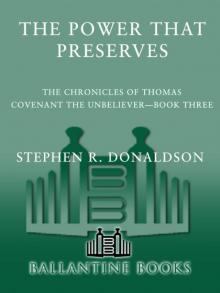 Thomas Covenant 03: Power That Preserves
Thomas Covenant 03: Power That Preserves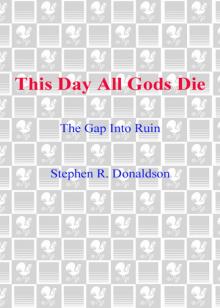 This Day all Gods Die: The Gap into Ruin
This Day all Gods Die: The Gap into Ruin The Wounded Land t2cotc-1
The Wounded Land t2cotc-1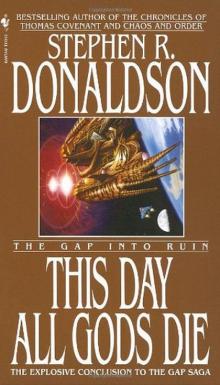 This Day All Gods Die
This Day All Gods Die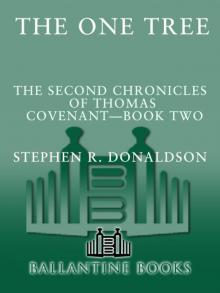 One Tree
One Tree